-
|
28 December 2018
|Posteado en : Reportage
There is still a long way to go to include persons with disabilities in all of our daily lives. This is why FIIAPP is working on projects such as Bridging The Gap to make this path ever shorter
Moment at one of the Bridging The Gap events in Paraguay“Any restriction or absence in the ability to perform an activity in the manner or within the range considered normal for a human being.” This is how the World Health Organization (WHO) defines disability. Definition published in 1980 in its International Classification of Deficiencies and Disabilities (CIDDM).
Likewise, the WHO estimates that more than one billion persons live with some type of disability, which represents 15% of the world’s population. More and more people belong to this group, which is closely related to the ageing of the population and the increase in chronic diseases.
For its part, the United Nations (UN), says that persons with disabilities tend to have fewer economic opportunities, more limited access to education and higher poverty rates. It also highlights that “children with disabilities are four times more likely to be victims of violent acts, the same proportion as adults with mental problems,” demonstrating the need to develop legislation to protect them. It must additionally be added that these people also face a series of obstacles such as transport and access to information.
Access to health, education and employment
Health is considered a fundamental right for society. However, for persons who have some type of disability it is extremely important, since their illness can improve or worsen depending on the healthcare provided, such as rehabilitation.
Although it seems somewhat paradoxical, persons with disabilities need more healthcare on a regular basis, but benefit the least from this right, since 50% do not have access to healthcare. According to the WHO, many persons with disabilities do not have sufficient resources to pay for their treatments, despite the fact that 80% of persons with some type of disability live in developed countries.
However, health is not the only area affected, these difficulties also extend to education. According to data from the National Institute of Statistics, there are currently around 560,000 disabled students in Spain between 16 and 17 years of age. Of these, 16.5% are in special education centres and the remaining 83.5% attend ordinary education. The number of students with disabilities is high but a high percentage of young persons with disabilities do not attend school, 43%.
At the global level, children with disabilities are less likely to attend school, especially if they are poor. We also found inequality in access to education between boys and girls. Therefore, “mechanisms must be improved to integrate girls with disabilities into the education system, and bring gender into the 2030 Agenda“. Says Ola Abu, Director of Research and Global Influence at the Leonard Cheshire charity.
Of the 3.84 million persons with disabilities in Spain, 481,000 are working. In relation to employment, persons with disabilities had a low participation in the jobs market in 2017, since according to INE data, their activity rate was 35%. Likewise, women with disabilities had a smaller presence in the labour market than men, a fact that shows the long journey that remains to inclusion and equality.
The world outlook is not very different since the employment rate of men and women with disabilities is much lower than those without.
Persons with disabilities in the 2030 Agenda
In its commitment to “not leave anyone behind”, the UN’s 2030 Agenda on Sustainable Development reflects the importance of inclusion and improvement in the conditions of persons with disabilities. The tenth objective of the 17 in the Agenda deals with the inclusion of persons with disabilities.
As we have previously indicated, persons with disabilities have difficulties when accessing health services. In this context, the UN emphasises that these people are up to five times more likely to face health expenses that are described as “catastrophic”.
Bridging The Gap
It is very important that international cooperation becomes a fundamental tool that allows governments to give visibility to persons with disabilities by including them in their political agendas. In addition to these, both society and institutions must come together to translate the needs of these persons to give them a voice and improve their current situation in the best possible way.
Ecuador, Paraguay, Burkina Faso and Ethiopia have benefited from this European Union-financed and FIIAPP-managed projectBridging The Gap. This project aims to reduce the social exclusion of persons with disabilities in low and middle income countries in Africa and Latin America.
The situation in the countries where Bridging The Gap works is complicated. According to Boukary Savadogo, permanent secretary of the National Multisectoral Committee for the Protection and Promotion of Persons with Disabilities in Africa, “in Burkina Faso persons with disabilities are not welcome.” In order to improve the situation of persons with disabilities in the African country, “Burkina Faso is aligned with the SDGs and the 2030 Agenda”.
It is important that we reflect and try together to improve the mechanisms so that persons with disabilities can have a dignified, full life in which they can enjoy each and every one of their fundamental rights.
-
|
22 November 2018
|Posteado en : Reportage
FIIAPP addresses human trafficking as a global problem: many countries are affected by being the place of origin, transit or destination of victims.
Image participating in the photography contest organised by the FIIAPP project to support the fight against drug trafficking and related crimes in BoliviaThere are many people who fall into the hands of organisations that exploit them, sexually or professionally, taking their freedom against their will. Human trafficking has become the form of slavery of the 21st century.
It is important to know what we mean by human trafficking, whose world day is celebrated on July 30. The United Nations Office on Drugs and Crime, UNODC, defines it as “the transfer of human beings from one place to another within the borders of the same country or abroad for the purpose of sexual exploitation, work or begging”.
To give an idea of the scale of this crime, the United Nations points out that there are around 21 million victims, 30 percent of them children and 70 percent women and girls. In addition, all these victims come from 137 countries, a fact that reflects the scale of this problem.
“Capture, trafficking and exploitation”
For there to be trafficking, “there need to be three phases: capture, trafficking and exploitation“, says Félix Durán, head of the Human Trafficking group of the Central Operative Unit (UCO) of the Civil Guard and expert of the project in the fight against drug trafficking in Bolivia, financed by the European Union and managed by FIIAPP.
Based on this, certain people are captured for exploitation, whether for labour, sexual, begging or organ trafficking purposes, among others; and this deception is used to take those people to other countries. “For there to be human trafficking, there must be transport and then exploitation,” says Félix Durán. The exploitation phase is the difference between human smuggling and human trafficking.
In addition, Felix Durán tells us that most of the cases of trafficking that occur in Spain are from people who come from southern Africa (especially from Nigeria), Eastern Europe (Bulgaria and Romania) and China. The profile of the victims is that of girls, especially from Nigeria, as well as elderly people in the case of Romania.
On the other hand, there is great difficulty in demonstrating an offence of human trafficking, especially if it is sexual. In order to be able to justify the crime judicially and be able to arrest the people involved, it is especially important to prove< the three phases mentioned, which in many cases is very difficult.
The case of Bolivia
In the Bolivian project, already mentioned, work is being carried out in the fight against human trafficking, since this problem is a crime related to drug trafficking, the main theme of the project. The project focuses mainly on the “3 Ps”: perception, persecution and protection.
There is a lot of trafficking in this country, so much so that Bolivia has been included “in the black list of countries that do not work against trafficking”, according to Félix Durán, an expert on this project.
Furthermore, a programme has been created in which training is provided to public officials who are closely related to this problem, working with both the national and municipal administrations.
In this regard, he emphasises the importance of cooperation projects in this area, in which “public officials who work on this struggle must be made aware” of the obligation to “provide training so that they know how to identify a case of human trafficking” and finally, as trafficking is a criminal offence, the need for international cooperation between institutions, according to Durán.
Nigeria, a place where human trafficking occurs
In the case of Nigerian women in Europe, 95% of them come from Benin City, an area of around 10 million inhabitants belonging to Edo State.
The majority of these girls are captured within a family environment in which their parents make them available to trafficking organisations. Such is the number of victims in this country that there are mediators from Benin City itself, many of them former victims of trafficking, who facilitate the work of the authorities in communicating with them.
In this country, the A-TIPSOM project, financed by the European Union and managed by FIIAPP, seeks to reduce human trafficking and irregular migrant trafficking, both nationally and regionally and between Nigeria and the EU. It also pursues five fundamental objectives, the “5 Ps”: policy or strengthening of institutions and the legal framework, prevention with awareness and training activities, protection of victims, prosecution of smugglers and traffickers and partnership or coordination of the actors involved.
According to Rafael Río Molina, coordinator of this project, the situation in Nigeria right now is complex, since “the country is a strong point of migration and transit” due to the fact that it is in the centre of the African continent. In addition, “the number of women and children who are victims and who fall into the network of prostitution and labour exploitation, according to statistics, is higher than that of men”, which is why they focus more on these groups.
The enormous number of cases of human trafficking currently in existence means that this problem must be addressed from a transnational dimension, through cooperation between countries and regions.
-
|
18 October 2018
|Posteado en : Reportage
The EU organises activities as part of European Cybsersecurity Month, an issue on which EL PAcCTO is working against organised crime
Changing passwords, configuring privacy settings and purchasing antivirus software are the necessary steps par excellence before browsing the internet. These steps are increasingly important to avoid the risks and dangers to which we are exposed on the internet and which require constantly updated information.
For this reason, each year the European Union organises a variety of activities, as part of European Cybersecurity Month (ECSM), that are dedicated to sharing good practices and promoting cybersecurity among the public and organisations. The European Cybersecurity Agency (ENISA), the European Commission and some 200 partners from the entire region took part in the sixth iteration of this awareness-raising campaign.
“Cyber security is a shared responsibility— Stop. Think. Connect” is the slogan for 2018. It reflects a step prior to entering the digital world, where everything is accessible and instantaneous. Think. Think what we are sharing, what we are writing or what we are clicking on.
Are we aware?
The operations director of ENISA, Steve Purser, told La Vanguardia that it is necessary to “develop electronic common sense”. In other words, “we must behave in a similar manner in the electronic world and in the real world” and not respond or provide information without thinking what it will be used for.
This is an attitude that is taking hold of the public and making us mistrust junk mail and web pages that literally jump onto our screen. In spite of this, many users fall prey to commonplace fraud or theft, which now have their online version.
These are dangers about which Antonio Roma, coordinator of cooperation between judicial systems for EL PAcCTO, spoke, saying that the problem is that “criminals are always going to be one step ahead and find other ways of getting to us”. Real computer crimes are more serious, such as the viruses that enter our equipment through files, or mass attacks that “affect general or even national security,” said Roma.
These attacks are often beyond our control but we must also be warned about them. For this reason, the judicial coordinator of the European Union-funded programme managed by FIIAPP and Expertise France, in cooperation with the Italian-Latin American Institute (IILA) and the Instituto Camoes of Portugal, stresses that campaigns like the EU’s are necessary because they are “measures that we should remember, our knowledge should be updated, the types of threats and the public’s awareness increased”.
With this aim, some 400 activities are being organised in various European countries: talks, user-focused workshops, web seminars, campaigns, etc. Madrid, Barcelona, Zaragoza and Valencia are some of the cities chosen to alert people to “a growing phenomenon”, according to Roma. In relation to awareness raising, he stated that “it is necessary not to lose sight of the fact that having security is necessary”.
Our privacy, one click away
According to the ENISA report, published at the beginning of the year, the main threat to users is malware or “malicious software”, in which there are viruses that come to us over the internet and in emails without our knowledge.
The next danger in the ranking is computer attacks and phishing or “identity theft”, a scam to collect users’ private data, especially access to their bank accounts.This information is frequently saved on our equipment. And it is our increased internet activity, either by opening accounts on different sites or publishing our lives on social media, that makes our privacy more and more exposed to these threats.
This risk is increased by the use of mobile phones, it is the price paid for greater accessibility. Antonia Roma emphasised, in relation to this point, the increasingly early contact of children with different devices.
“Previously, the advice was to keep the computer in the living room,” he said. This is outmoded advice regarding safeguarding their privacy in the face of the bullying taking place and, in the worst cases, child pornography. In this situation, “It is always better to alert children to how to defend themselves and that their privacy has great value,” recommended Roma.
What does cooperation offer?
The internet is a worldwide network and although the crimes may be committed from a computer close by, we can also be scammed from servers in other countries. This is where cooperation comes in. According to Roma, it is often unsuccessful, when the money from a theft ends up in “faraway countries that do not provide effective cooperation.”
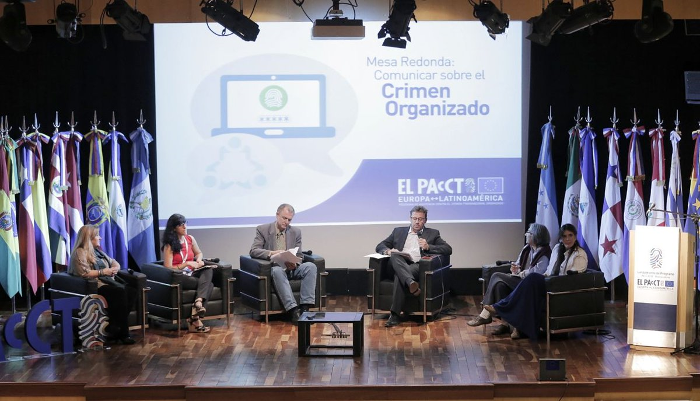
Official launch of EL PAcCTO Despite what are called “opaque jurisdictions”, he believes that “legal cooperation has changed” and that, for example, there are new systems for freezing IP addresses. The time factor is the major obstacle: “getting there too late” when the police do not help or are not trained. Specialisation, in conjunction with technology, are, according to Roma, the tasks that have yet to be addressed in this field.
Cybercrime and cybersecurity are topics that concern EL PAcCTO and on which work is being carried out across the board by all areas of the programme: police, courts and prisons. The EU-funded programme helps Latin American countries to combat organised crime, which also operates over the internet.
The aim is to tackle this issue at the regional level, in addition to the concerns of specific countries, by “implementing operations to see what the problems are, where the bottlenecks are, so that there can be an effective flow of cooperation.”
-
|
06 September 2018
|Posteado en : Reportage
How do you fight against drug trafficking in a coca leaf producing country? We know the case of Bolivia together with the project to support institutions in this task
Project formation in BoliviaThe United Nations Office on Drugs and Crime (UNODC) states in its report on coca leaf crops in Bolivia that the country has more than 20,000 legal hectares. An extension concentrated on two main areas: the area of the Yungas, in the Department of La Paz; and the area of Chapare, in the Tropic of Cochabamba.
The UNODC thus provides information to the Bolivian government on the amount and geographical location of the crops, since part of the coca leaf is diverted to illicit trafficking. The Bolivian Police and other institutions involved are trying to avoid this product becoming an international drug. This report allows them to develop strategies and policies for their control.
These institutions also have the support in this task of a project managed by the FIIAPP , in coordination with the National Council for the Fight against Illicit Drug Trafficking (CONALTID), with funds from the European Union and the AECID (Spanish International Development Cooperation Agency). And the paradox is even more difficult to tackle when the coca leaf is a cultural product.
The farmer is not the trafficker
Javier Navarro is one of the experts of the project. The Spanish National Police inspector recalls that “the consumption of coca leaf is something that is deeply rooted in their customs.” In Bolivia, the product is consumed directly with the acullico (chewing the coca leaf itself with other products that sweeten it) or is used for yerba mate or sweets.
Its production is managed through cooperatives. Each registered farmer has the right to grow one cato (1,600 square metres plot) of coca. The product would reach the legal market after going through the cooperative. The problem is that not all production follows that path.
Part of the coca leaf enters “parallel circuits” and with it the base paste from which cocaine hydrochloride comes out is made. Once this substance is obtained, we speak of trafficking itself, explains the police inspector. There are also illegal crops “in border areas or areas that are difficult to access”.
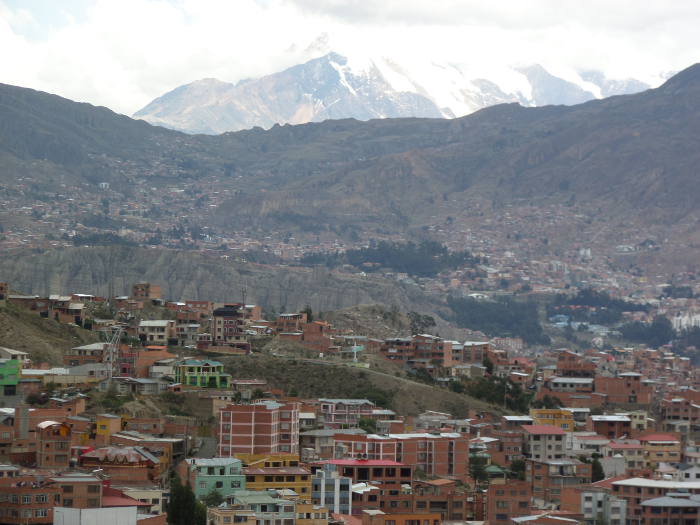
La Paz (Bolivia) None of the farmers, however, cooperate on this, they just live on it. “The producer does not have the profile of a trafficker,” says Navarro, and even if they acted unlawfully, they would be the smallest link in the entire drug trafficking chain.
Javier Navarro also points out that “Bolivia is not only a producer, but also a transit country”, mainly due to geographical issues. The base paste comes to the country from Peru, which is also a producer, to carry out the so-called “purification” in laboratories.
And he provides an important fact: “One kilo of cocaine hydrochloride costs 2,500 dollars in Bolivia. When it arrives in Spain, it costs 35,000 dollars.” Once again, Spain acts as a transit country: from here cocaine is exported to France, Italy or Great Britain with the resulting price increase. A journey that makes it a transnational problem.
What is the aim of the project?
To deal with this problem, members of the Civil Guard and the National Police work on this project with Bolivian officers in the fight against drug trafficking and related crimes, such as money laundering and human trafficking. Action is additionally taken at borders and airports.
In particular, the Special Force to Fight against Drug Trafficking is formed, specialised units spread over several areas of Bolivia. Drug trafficking is the dominant sector in organised crime. The changes in its methods of organisation and action require constant adaptation in the devices and strategies fighting this problem.
This training that has been complemented by visits to Spain to learn about the procedures of the Spanish security forces, for example, in intelligence and criminal investigation.
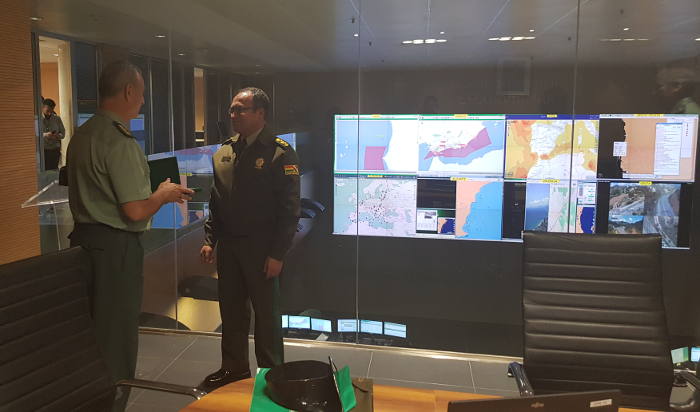
After two years of work, “the project is consolidated and it is the institutions themselves that come to it”, explains Javier Navarro. Among other things, the investigations have been addressed in a more comprehensive way. This is, according to the inspector, to not only stop the trafficker, but also to have the organisations dismantled.
This work is completed with the citizens’ awareness through some communication activities. The last of these, a workshop for journalists in which they worked on how to adequately communicate on such sensitive issues.
Projects for a transnational problem
Until recently, the FIIAPP managed a similar project in Peru , an example of good results with the dismantling of more than one hundred criminal organisations dedicated to illicit drug trafficking. The Foundation is also present in this operational dimension with the SEACOP project, for the fight against maritime drug trafficking.
There are also regional programmes to add to the public policies of Latin American countries. This is the case of EL PAcCTO against transnational organised crime or COPOLAD , which covers the social and health dimension.
Other projects follow the most important drug trafficking routes, such that of as heroin. EU-ACT operates in 30 countries in Central Asia, the East Coast of Africa and Eastern Europe, and works to improve the effectiveness of police and judicial bodies, as well as to prevent drug use.
-
|
28 June 2018
|Posteado en : Reportage
The revolutions in North Africa and in the Middle East initiated democratic reforms, but also left space for threats such as terrorism. In both cases, cooperation has played and continues to play a determining role
Tunisia was the country where the Arab Spring startedIn 2011, people took to the streets of the Middle East and North Africa. The Arab world called for democracy and rights in their countries through popular protests that were included in the concept of Arab Spring. Seven years later, the changes are not entirely noteworthy. Armed conflicts and terrorism have curtailed many of those expectations. However, political, economic and social reforms were initiated, which in some cases continue to develop at a slower pace.
These are processes in which cooperation has played and can play a determining role, contributing experiences from other countries that have gone through similar situations or confronting threats that slow down development. In this context of transition, several projects in the region are managed by FIIAPP with European Union funding. Those that have to do with justice and security particularly stand out.
Tunisia was the first country where revolution was mentioned. Since then, “there has been a first democratic election, a constituent government and an approval of the Constitution in 2014”. This was explained by Ángel Llorente, coordinator of the project to accompany judicial reform in the country that ends this year. The objective has been to carry out “an organisational reform as a consequence of the process of democratic transition” in the Ministry of Justice. And to create from there an independent judiciary that had never existed in Tunisia.
Despite some resistance that could have meant a step backwards, Llorente believes that civil society will not let that happen: “They are very aware of their rights, I think it is very difficult that they could now give up something that has cost them a lot to achieve”. An enthusiasm that reminds him of Spain a few years ago.
EuroMed Justice IV is also committed to improving judicial systems. In this case, in the southern region of the Mediterranean. Algeria, Egypt, Israel, Jordan, Lebanon, Libya, Morocco, and Syria are working together with the Spanish and French Ministries of Justice to create an efficient, democratic system that respects human rights and is consistent with international regulations .
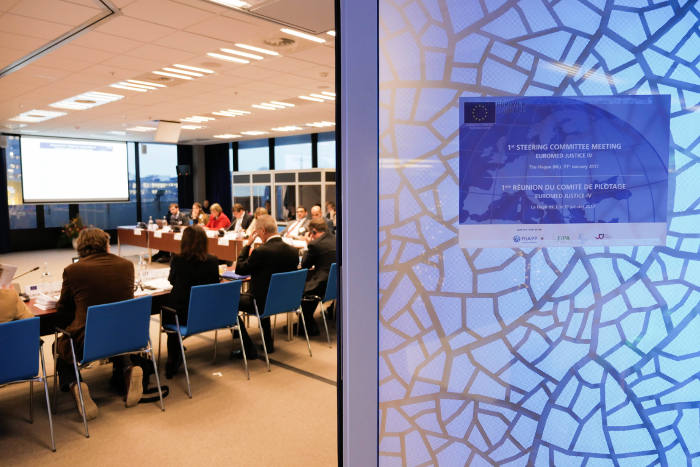
Meeting of EuroMed Justice IV in The Hague In its fourth phase, the project is also part of the EU’s neighbourhood strategy. Most of these countries are included in the European Neighbourhood Policy, which was revised precisely in the context of the Arab world revolutions to provide better support in their democratic transitions. After all, its main objective is to strengthen relations with neighbouring countries in the community space, based on common values – democracy, human rights and the rule of law – and to promote greater economic integration, mobility and stability.
Relationships that, in the case of EuroMed Justice IV seek a necessary international judicial cooperation, according to Victoria Palau, coordinator of the project. “There are problems, such as terrorism, cybercrime and human trafficking, that, if not resolved at the regional level, are impossible to address,” she says. In this context, the project witnessed the first declaration of collaboration between European public prosecutors and the Mediterranean countries, to work together to address these problems.
Judicial cooperation is also one of the components of the project for the application of the Rule of Law in the Horn of Africa and Yemen, the objective of which is to fight against security threats. In particular, it works to improve the capabilities of the intelligence services, the security forces, and the prosecutors and courts.
Eritrea, Ethiopia, Kenya, Somalia, Sudan, South Sudan, Uganda, Yemen and Djibouti are the countries that benefit from this project funded through the Instrument for Stability and Peace (IcSP). What happens in these countries, even if they are not included in the neighbouring region of the EU, does affect the continent.
In addition, it is an example of how terrorist groups take advantage of moments of political instability to act. “When there is a power vacuum, these groups always try to sneak in with more or less success,” says Javier Vega, project coordinator. In the end, terrorism is an increasingly global threat with an important focus in this geographical área.
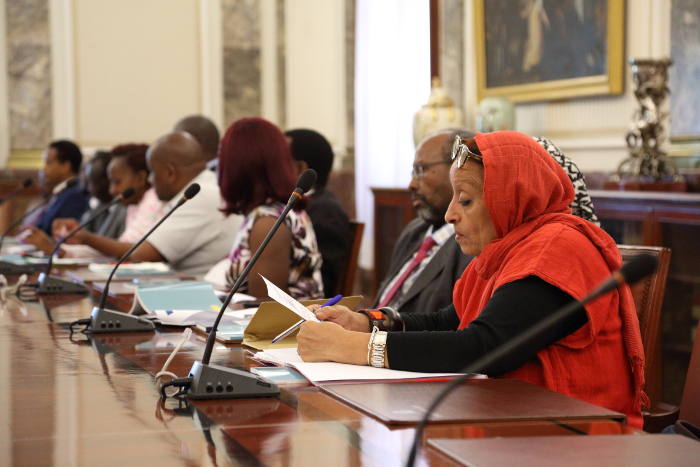
Visit of judicial authorities from the Horn of Africa to the State Attorney General’s Office The key is to act regionally so that it does not spread to the rest of the world. For example, by controlling the territory as is also done in the Sahel region – through the Rapid Action Groups – and in Niger, more focused on illegal immigration.
The European Security Agenda underlines the need to take measures to deal with this threat in a more effective and comprehensive way, including the international community and cooperation projects. One of the latter, also managed by FIIAPP, focuses specifically on the fight against terrorism in the MENA region (Middle East and North Africa).
Work that, according to Mariano Guillén, director of the Justice and Security Area with FIIAPP, also seeks to “strengthen the political dialogue within the Arab League”, to favour cooperation among the countries of the region. Morocco, Algeria, Tunisia, Libya, Egypt, Jordan, Lebanon, Iraq, Syria and Palestine are the countries that, despite their political, economic and social differences, work to find common responses to terrorism. “The terrorist threat does not distinguish the levels of development in the countries and it can only be attacked through cooperation,” says Mariano Guillén.
The instability of the changes leaves room for security threats that do not recognise borders. But the same changes are necessary if we see them as an opportunity to improve, as a good time to draw on similar experiences while working together on those problems that affect us all.
-
|
31 May 2018
|Posteado en : Reportage
A number of projects managed by FIAPP are taking part in the European Development Days 2018, with gender equality as the overarching theme
EDD 2017 also had a focus on gender“Women and Girls at the Forefront of Sustainable Development: protect, empower, invest” is the slogan chosen for the European Development Days 2018, which will be held next week in Brussels. On 5 and 6 June, the capital of Europe will also be the capital of development.
This is because, this year, the days organized by the European Commission have gender equality as their central theme. As well as promoting the participation of women in the various forums, this edition hopes to make this a safer, more open and more inclusive world for all of them.
The most important development event in the world, which is open to the public, will pack 500 meetings into two days, in which more than 2,600 speakers will take part. Among them will be 7 Nobel laureates and 100 world leaders. FIAPP will also be attending the European Development Days (EDD) to represent four of the projects that it manages: EUROsociAL+, Bridging the Gap, Triangular Cooperation and EUROCLIMA+.
The EUROsociAL+ programme promotes cooperation and dialogue between the European Union and Latin America on promoting public policies to improve social cohesion and reduce inequality in Latin America.
However, for Enrique Martínez, Communication technician for the programme, “these public policies are only effective when they attack the inequality gap between men and women, a challenge and a goal that are strongly etched into the EUROsociAL+ DNA”.
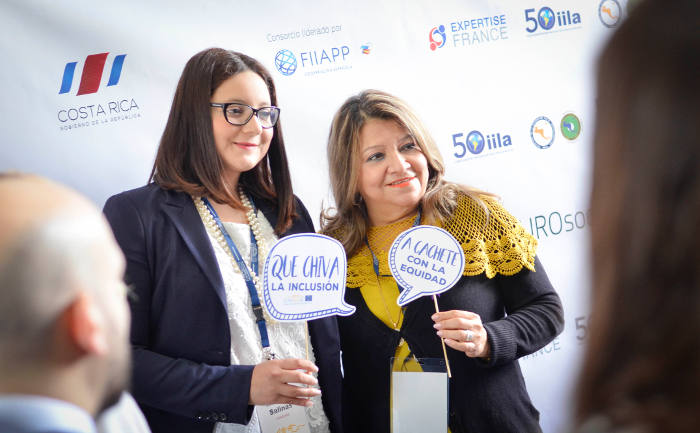
This is why, in Brussels, the programme is sharing three advances in gender equality policies, in Paraguay and Mexico and, at the regional level, in Latin America. In addition European transfer on this subject.
The executive director of the Social Cabinet of the Office of the President of Paraguay, Mirta Denis, the executive secretary of the Mexican Institute for Women, Marcela Eternod, the director of Fundación Género y Sociedad, Ana Isabel García Quesada, and the French State Counsellor, Marisol Touraine, make up “100% female EUROsociAL+ panel as a contribution to this collective journey to full equality”, said Martínez. In addition, the round table discussion will be opened and closed by Jolita Butkeviciene, Director for Latin America and the Caribbean at the European Commission Directorate General for International Cooperation and Development.
The Bridging the gap project is also taking part in the 2018 European Development Days, with a session on Women on the rise – no one left behind!, organized jointly by the EU Social Protection Systems Programme and the NGO Light for the World. This is the presentation video:
The aim of this session, according to Carmen Serrano, the project’s communications technician, is to “show that, in spite of the two-fold discrimination that disabled women face, they are spearheading sustainable development in low-income countries”. Four women will therefore share their experiences of gender and disability issues based on the different viewpoints tackled by the three viewpoints structuring the session: Social protection, leadership and entrepreneurship, and access to work and economic empowerment. It will be moderated by Hisayo Katsui, a researcher into and expert teacher on disabilities.
However, said Serrano, “The aim of presenting “Bridging the Gap” at this great European event is not just to share experiences but to create a dialogue and reflection on the role of women with disabilities in their communities”. This is why they have chosen to use the format of a Brainstorming lab. For 75 minutes, there will be constant interaction between the speakers and the audience so as to collect inputs and ideas on how everyone can create awareness among those around them of the contribution that women with disabilities can make to society.
The Evalúa project, which seeks to promote Public Policy Evaluation in Latin America and the Caribbean, will attend the EDD’s for the first time to talk about some of the results obtained since its inception in 2014.
The project coordination team will attend this international cooperation forum to present one of its most recent projects, the results of the evaluation of the Costa Rican Gender Equality Policy. Also, the management, led by the Ministry of Planning (MIDEPLAN) evaluation team, will be represented by Ericka Valerio, from the Evaluation and Monitoring department.
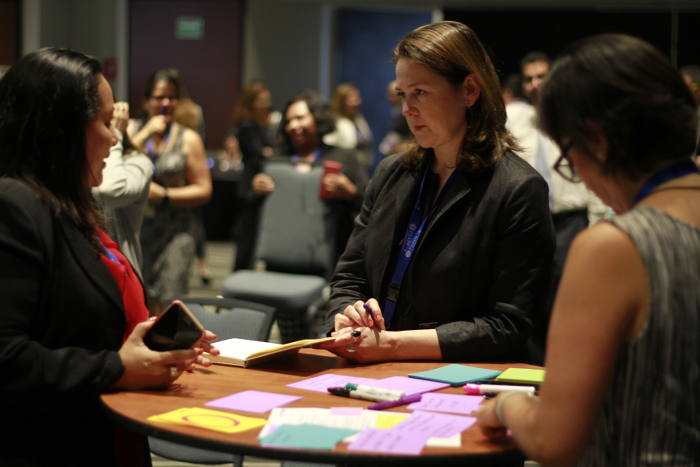
The project is part of the ADELANTE programme, which aims to improve integration in Latin American and Caribbean countries and to contribute to their reaching their development goals (SDG). The EDD will be an important place for presenting the major conclusions and recommendations of that public policy evaluation and the planned use of this evaluation as an input to the following stages.
According to Alina Orrico, a project technician, “It is especially important to take part in this event, in which there are much fewer Latin American experiences than from other continents and, above all, because it is taking place in a year filled with emotions, demands and allusions to the need to present tangible answers that will guarantee gender equality.”
EUROCLIMA+ is the European Commission’s regional programme to promote environmentally sustainable development in Latin America. This action benefits the most vulnerable population groups, focusing in particular on gender, the impoverished rural population and indigenous peoples.
During the event, a video will be projected on Gender and Climate Change and an information map of Latin America will be drawn using gender-related information.
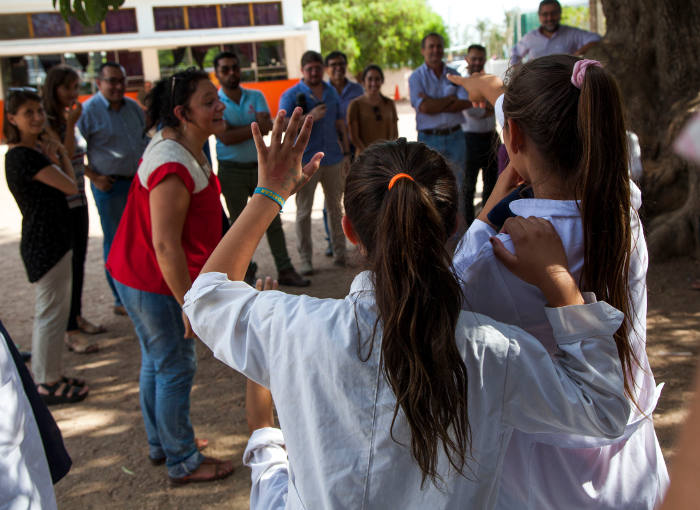
EUROCLIMA+ helps countries to develop their Nationally Determined Contributions or NDCs to the Paris Agreement. NDCs reflect the commitment of the international community to facing up to the effects of climate change.
According to Alexandra Cortés, an expert in Communication and Visibility for the programme, NDCs “promote the inclusion of climate action in a policy framework that can lead to economic growth and social development, in addition to protecting the environment and climatic resilience”.






